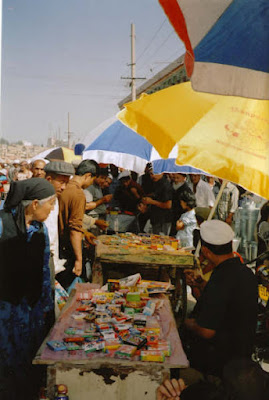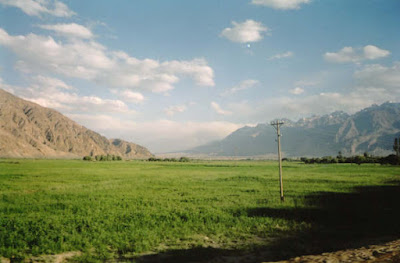Kashgar Afternoon
by Armando Ortiz
On my first visit to Kashgar, which is in the Xinjiang Province of China back in the summer of 2002, I was taken to a restaurant by a local foreigner whom I had met that week that had experience living in Western China. He’d been staying next door to me, and the Joni Mitchell music he kept playing he piqued my interest. My year long study program in Seoul, South Korea at Yonsei University was over and I wanted to visit China again before returning home. I was there just being a tourist, wandering, the winds of interest and curiosity had settled me on this western ground. I was told we were going to have a local specialty, a roasted chicken. Never once was I able to have that dish ever again. The dish had been prepared in the kitchen, of course, and cooked in a tandori like oven. It was delicious along with some local nan, a huge tortilla like bread. The chicken was crispy to the bit and the salty oiliness mixed well with the nan. We might have had tea to drink but at this point I no longer remember. When I do remember from that lunch was the spectacle that we were about to encounter on leaving the restaurant.
We talked about travels throughout the country and other adventures. Nonetheless, it was time to go and we paid our bill. Hardly a cent was laid on the table and we walked out full and content. As we were walking to the door something like a buzz or a hum could be heard. A small crowd was gathering near the restaurant we had just exited. It was sunny outside so the transition from the small diner to the outside was like going into a different world. All of a sudden I could hear the strumming of what sounded like the plucking of a rockabilly bass, but not as low and heavy as that. It was very fast, and gentle, almost reminding me of the song that John Travolta and Emma Thurman danced in the middle of the diner.
The musician playing was sunweathered. His clothes were mostly a western styled suit, which might have been a faded black or a used blue. He’d been doing this for years, it appeared. He looked as if he could have been sipping coffee under the noon light, maybe smoking a stogie somewhere in the middle of the American southwest waiting for the sun to set. He wore a square cap, with simple brocade loops that seemed to house fine Turkic lettering, his face looked calm, shoulders were square not round like the city folk in LA. Could he have been staring off into space? Could he have been the sitting model for a buddha statue back in the day when Buddhism spread throughout the Tarim Basin, with half closed eyes staring at the crowd? Maybe he’d smoked some hash before this impromptu performance?
The music, the rhythmic strumming and twang that I heard immediately took us to the ground of people that surrounded the aged man. It felt like the crowd parted as we approached the bard. He just kept at it, his fingers long, wrinkled and dexterous, kept dancing and jumping from the top of the next of the banjo like instruments to the middle of the neck. It was almost like a dream, and maybe it was because I didn’t take a photo, and I didn't ask who the person putting on the street show was, but I still remember the music and the scene.
It might have lasted 10-15 minutes at most, but it is still a memory that sorta floats around when I think of my travels to that distant province and to its edge and fringe where 8-track players, and old Motorola phones were being sold. Despite the steady reach of technology, people here still circled around a troubadour, listened, admired and enjoyed some live music. Even though, sometimes we believe that we are different from others, in reality we all love some good live music, whether it be by someone performing for donations or playing at a sold out concert at the Hollywood Bowl. The band could be playing in front of a church audience or at a speakeasy. We all enjoy good live music, but what is most surprising is how music seems to have this hypnotic effect on people wherever they may be on this earth.


